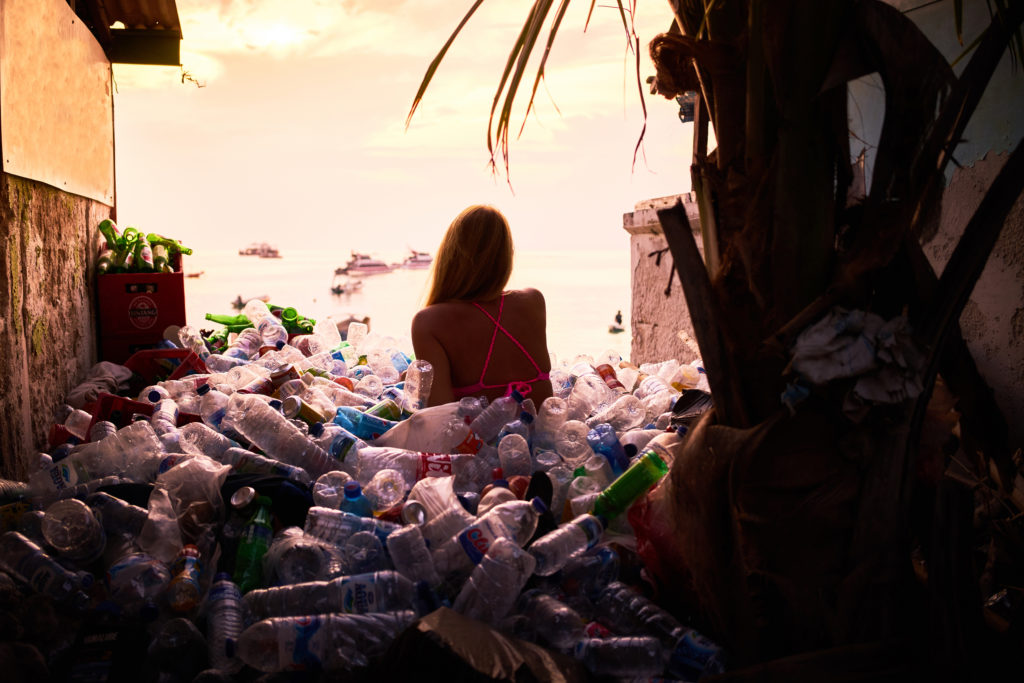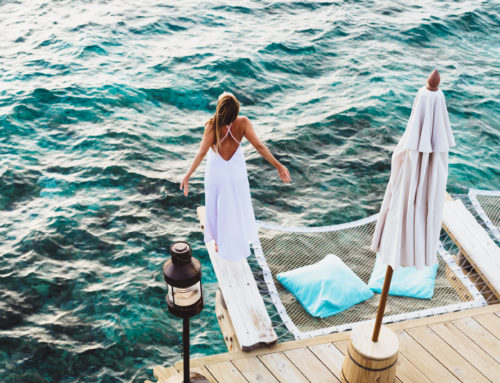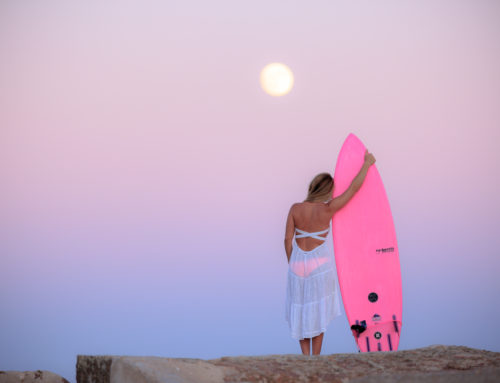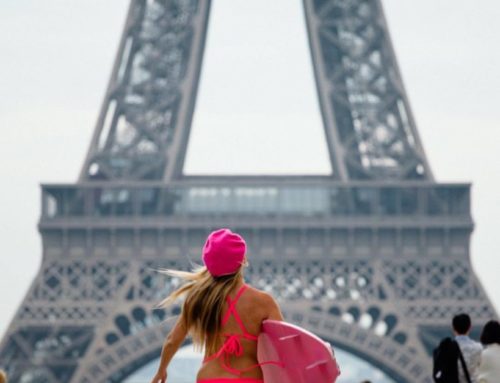This shocking film shows the current global plastic epidemic and provides some immediate solutions to stop using single-use plastic.
Press interview with Alison:
How did the idea for the Indonesia clothes-making project come about? What were you looking to create in the items of clothing?
Alison Teal, TV star and eco-adventurer filmmaker recently traveled to Indonesia to work with the conservation group Orca365, and was stunned at how much the plastic pollution issue had worsened from the last time she was there.

“Growing up and working in places like Bali, the Maldives, Mexico, and Hawaii, I’ve watched plastic pollution plague these pristine places” declares Teal.
Teal explains, “While positive efforts are being made by organizations and local villagers, I am scared that our planet is close to being completely suffocated by plastic.”

Pushing plastic out of her way to swim with manta rays Alison Teal thought, “How can I demonstrate the issue and share how invasive this situation is?” She was filmed underwater to document what is happening in the ocean, and then photographed different images wearing the plastic she found surrounding her in Indonesia. This “Plastic Girl” photo series is Teal’s artistic symbolism of “how we will all be suffocated by plastic if we don’t look for alternatives to our daily plastic needs.”

The toxic smoke from burning plastic seared my lungs as I walked through what looked like an apocalyptic wasteland.

This has been the case in many countries Teal has visited who don’t have modern recycling facilities, while slow-burning plastic can physically reduce the landfill, the smoke can cause detrimental effects on human and animal life.
It’s time for our world to quickly come up with technology solutions and global bans on single use plastic.

How long, roughly, did each take to create?
It took a few moments to create each outfit as I simply wrapped the pieces I pulled from the ocean around my body such as red plastic bubble wrap, black plastic bags, water bottles and a white bag top tied fishing net that entangle turtles. There was no hair, makeup, or fashion prep, lighting or planned fashion shooting. It was a powerful moment for me to feel completely engulfed in trash.

How did it feel swimming with creatures while wearing these outfits?
“As plastic bags literally coated my face while swimming with the marine life, I gathered the bags and kept wrapping them around my waist. Everything I’m wearing is an item of trash I pulled out of the ocean, hopefully saving the life of a marine animal. Plastic bags were removed from the water from right in front of a manta ray” Teal says.
“It was sad and shocking to see the sea surround the majestic manta rays full of plastic, and I was determined to do my part to clean up the sea with my bare hands and feel the weight and suffocation of pulling that much plastic around on my body.”
How did it feel swimming with creatures while wearing these outfits?
Plastic pollution is not just an issue in Indonesia, it is a global epidemic.
Plastic is migrating in ocean currents from all over the world and reefs are being destroyed by it. Reef fish are mistaking plastic for algae and can’t digest it, and in turn, humans are consuming that same fish – we are essentially poisoning ourselves!

Marine life is dying at an alarming rate as are the coral reef systems that provide approximately 70% of our world’s oxygen.
- 91% of plastic waste isn’t recycled.
- Every year, 8 million metric tons of plastic end up in our oceans.
- Plastic chemicals can be absorbed by the body.
- 93% of Americans age six or older test positive for BPA, a plastic chemical.
- 80% of marine litter comes from land-based sources.
- One million plastic bags are used every minute.
- Plastic pollution in the ocean will outweigh fish pound for pound by 2050
- Nearly a million plastic beverage bottles are sold every minute worldwide.
- Burning plastic creates deadly toxins for the human body, and greenhouse gases contributing to climate change.

What message do you hope these images and the video get across?
“The TIME to act is now. We need to seek alternatives to our daily plastic use to save our oceans, marine life, and reefs from devastation. Step by step we can work toward large form solutions to stop the production of single-use plastic.
The health of our oceans depends upon consumer choices and programs to inspire government change.
Orca365 and I want to inspire travelers to experience the beauty of Bali and participate in cleaning up the beaches and reducing our need for single-use plastics.
I’m proud to be helping ORCA365 begin to find solutions for Indonesia and support their efforts as a surfing community to give back by helping local charity.
We protect what we love. I want everyone to fall in love with special places around the world like I have.
With this campaign, we hope to inspire others to think global and ACT locally!
As individuals, we can all take action to cease single-use plastic today and start using products that are eco-friendly like Mobot and Zoetica
I choose to replace about 200 plastic water bottles a year by using a Mobot water bottle.

Since more than 40% of plastic is used just once, I carry a Zoetica bag with reusable items like straws, utensils, and cups.”

Anything else you wish to add?
“When I step off the plane in Bali I feel like I am home. From the lush tiers of rice paddies to the world-class diving and the famous fire dances, there is almost tangible magic in the air. The culture is fascinating and their smiles make it impossible not to be happy” explains Teal.
We must protect paradise before it’s too late.

Ocra365: https://www.orca365.com
Zoetica: http://zoeticalife.com
Mobot: http://mobot.com
Alison Teal: http://www.instagram.com/alisonsadventures/







Leave A Comment